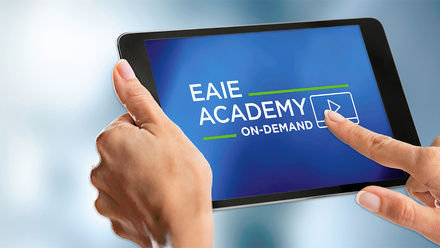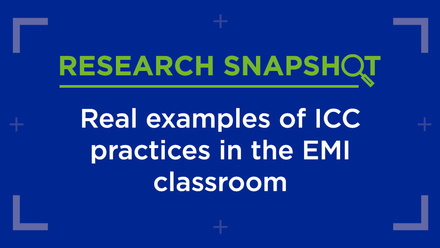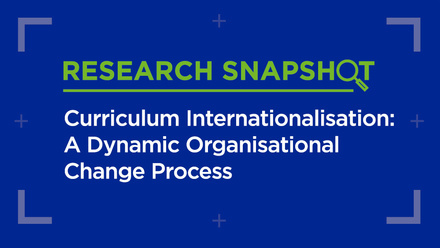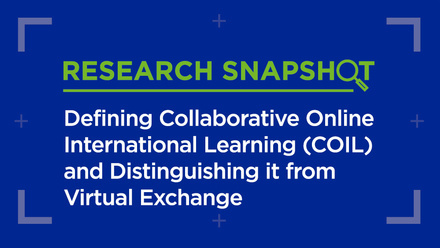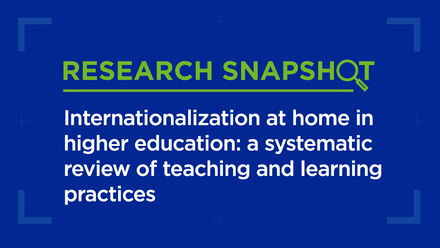A tale in two cities: Using virtual exchange to boost faculty-led programmes

Many higher education institutions today use both international virtual exchange/Collaborative Online Interactive Learning (IVE/COIL) and faculty-led study abroad programmes (FLP) to bolster their global offerings when internationalising the curriculum. In my role as Clinical/Teaching Professor at Drexel University’s LeBow College of Business, based in Philadelphia (USA),I have focused on global teaching and learning with both models for over a decade and have used each to foster relationships with partners and support our respective programmes. In prior years, colleagues and I have brought our students to meet one another after our COIL/IVE projects for a combined FLP. In some programmes, we had the opportunity to meet our partner students abroad, while in other programmes, we were able to invite partner faculty to guest lecture during an FLP in both their institutional cities and other locations. These experiences have resulted in deeper relationships, increased successes and fantastic learning (and some fun along the way).
So, how do we take it a step further? Over the spring break period in March of 2024, I worked with a colleague from my own college to design and offer a one-week long ‘dual/parallel city’ FLP using COIL/IVE to provide broadened learning and discussion — our very own ‘tale in two cities’.
With two equally sized cohorts, one in Florence and the other in Barcelona, nearly 50 undergraduate students participated in a course called ‘Exploring Business Culture in Italy’ or ‘Exploring Business Culture in Spain’. The courses had the same learning goals, overall syllabus and structure. Prior to their departure, both groups of students met as one and prepared together, learning about what was to come during their own programme as well as the other. On the ground, activities mirrored each other, and during the week, teams were formed (with members in each city) so students could engage in virtual exchange. The extended groups met twice for faculty lectures and workshops and twice for self-directed sessions to discuss content and learning for comparison and contrast. Essentially, the students were in two places at once! After their return, the cross-city student team completed an in-depth research project based on a selected programme topic/theme, sharing and combining their knowledge of both cities and countries. These projects were presented to the community at the university’s annual Week of Undergraduate Excellence.
Examples of assignments and activities that united the two cohorts, both face-to-face and virtually, included the following:
- Prior to their travel, students conducted a search, review and discussion of product advertisements in their respective countries. In their teams (consisting of members from each city programme), they shared their work and compared both business and cultural approaches to advertising.
- While abroad, the cohorts each participated in service-learning activities. The next day, in a follow-up IVE workshop, the teams shared their experiences and further explored the importance of community involvement and its impact in both Italy and Spain.
- While abroad, each cohort learned about the wine industry in their respective countries, visiting a local winery. This generated discussions on a variety of topics, including entrepreneurship, marketing, global trade, sustainability, finance and strategy. Again, in a follow-up IVE workshop, students shared their learnings, creating and delivering a brief presentation on the bigger picture through best practices. They also began to compare their findings with domestic (US) practices which helped contextualise the knowledge learned during their IVE experience.
- Post-travel, the integrated teams completed a semester-long research project on a topic related to their experiences abroad. The projects were presented at a poster fair, highlighting both the Italian and Spanish cohorts, as a part of the ‘Tale in Two Cities’ session at the Week of Undergraduate Excellence. The FLPs that included COIL/IVE were also shared with the university community through a college published article and other social media posts.
Bringing together FLPs with COIL/IVE further enhances the internationalisation of the curriculum at both the home institution and abroad. If you plan to explore this special model, you might want to keep a few special considerations in mind. Here are my top tips:
- Start out with faculty who are experienced in running COIL/IVE programmes and/or FLPs abroad, and those who may have already worked together on joint projects or taught the same courses. They can then model best practices for newer faculty and work together effectively to streamline and perfect the course.
- Be prepared to put in more time and effort than you might expect, even when working with faculty who have already collaborated with one another and/or have experience with running these kinds of programmes. The added factor of the virtual exchange to the FLP abroad is very valuable but does require a lot of added coordination and planning.
- Remember to fully integrate the cohorts and courses during all stages of the programme — before, during and after. The physical and virtual mobility during their ‘dual city' experience is rather special and motivational. Beginning this journey before setting off for their destination city and meeting up afterwards for a post-programme project enhances the students’ experience and cements their learning objectives.
- Ask for administrative support while on location as needed. Added resources are essential for success. This could include, for example, an experienced on-the-ground logistics team procured through a third-party provider. Although costs are always a consideration, the connections and experience of an organisation in the industry allows the faculty to focus more on the students’ learning experience and the COIL/IVE while on the ground.
Finally, following your success, make sure to get the word out and continue to grow the model for future iterations. The faculty and students involved in my ‘Tale in Two Cities’ are certainly ready for more. For an in-depth discussion of the course specifics, read our story and student testimonials in this university article. And perhaps we now have a new acronym—an FLVEP (faculty-led with virtual exchange programmes) abroad!

